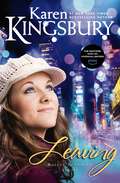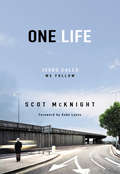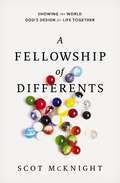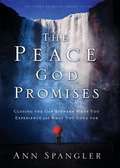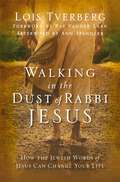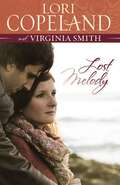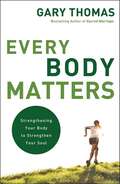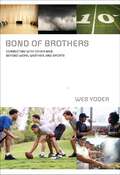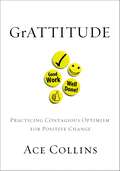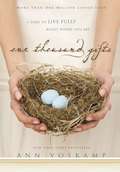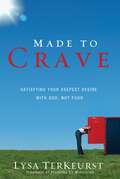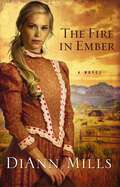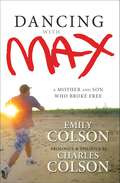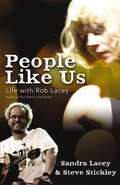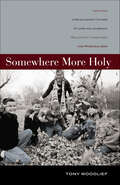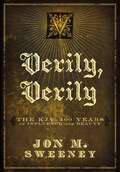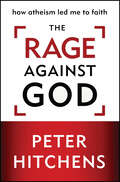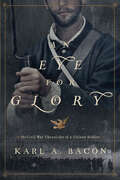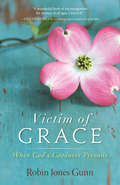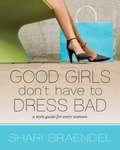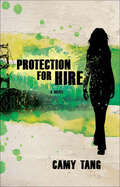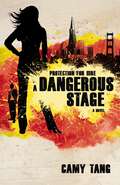- Table View
- List View
Leaving (The Baxters—Bailey Flanigan #No. 1)
by Karen KingsburyA small-town girl finally has her chance at becoming an actress on Broadway--but can she really give up everything she's ever known?Bailey Flanigan is finally leaving her small-town home of Bloomington, Indiana, for the adventure of a lifetime: she has gotten a part in a Broadway musical in New York City. She's determined to take advantage of this unbelievable opportunity, but is she really ready to leave family and friends for the loneliness of the big city? And what about Cody, her former boyfriend? His disappearance has her worried about their future and praying that their love can survive.Cody has been struggling with his own problems. In order to be closer to his mother, who's in prison for a drug charge, Cody takes a coaching job in a small community outside Indianapolis. New friends, distance, and circumstances expose cracks in his relationship with Bailey.Love, loneliness, big opportunities, and even bigger decisions put these two young people to the test in the first book in the Bailey Flanigan series. Features members of the popular Baxter family from New York Times bestselling author Karen Kingsbury's beloved Redemption series, now streaming onlineSweet, contemporary Christian romanceThe first installment of The Baxters--Bailey Flanigan series Book 1: LeavingBook 2: LearningBook 3: LongingBook 4: LovingIncludes discussion questions for book clubs
Unlocked: A Love Story
by Karen KingsburyBefore You Take a Stand … You Got to Take a Chance. Holden Harris is an eighteen-year-old locked in a prison of autism. Despite his quiet ways and quirky behaviors, Holden is very happy and socially normal—on the inside, in a private world all his own. In reality, he is bullied at school by kids who only see that he is very different. Ella Reynolds is part of the “in” crowd. A cheerleader and star of the high school drama production, her life seems perfect. When she catches Holden listening to her rehearse for the school play, she is drawn to him … the way he is drawn to the music. Then, Ella makes a dramatic discovery—she and Holden were best friends as children. Frustrated by the way Holden is bullied, and horrified at the indifference of her peers, Ella decides to take a stand against the most privileged and popular kids at school. Including her boyfriend, Jake. Ella believes miracles can happen in the unlikeliest places, and that just maybe an entire community might celebrate from the sidelines. But will Holden’s praying mother and the efforts of Ella and a cast of theater kids be enough to unlock the prison that contains Holden? This time, friendship, faith, and the power of a song must be strong enough to open the doors to the miracle Holden needs.
One.Life: Jesus Calls, We Follow
by Scot Mcknight Gabe LyonsWhat is the “Christian life” all about? Studying the Bible, attending church, cultivating a prayer life, witnessing to others—those are all good. But is that really what Jesus has in mind? The answer, says Scot McKnight in One.Life, lies in Jesus’ words, “Follow me.” What does it look like to follow Jesus, and how will doing so change the way we live our life—our love.life, our justice.life, our peace.life, our community.life, our sex.life—everything about our life. One.Life will open your eyes to the full, compelling immensity of what it means to be a Christian. “Jesus offers to us a kingdom dream that transforms us to the very core of our being,” says Scot McKnight. “His vision is so big we are called to give our entire life to it. His vision is so big it swallows up our dreams.” Discover exactly what Jesus meant when he announced the arrival of God’s kingdom. Equipping you with a new understanding of that kingdom’s radical nature, One.Life shares profound, challenging, and practical insights on how to demonstrate its reality in your life. In many ways, what The Cost of Discipleship by Bonhoeffer challenged Christians to do in earlier generations, One.Life will do for a new generation. One.Life will call you beyond the flatlands of religiosity toward a kingdom vision that will shape everything you do.
A Fellowship of Differents: Showing the World God's Design for Life Together
by Scot McknightIn this compelling book, Scot McKnight shares his personal experience in the church as well as his study of the Apostle Paul to answer this significant question: What is the church supposed to be? For most of us the church is a place we go to on Sunday to hear a sermon or to participate in worship or to partake in communion or to fellowship with other Christians. Church is all contained within one or two hours on Sunday morning. The church the Apostle Paul talks about is designed by God to be a fellowship of difference—how people differ socially—and differents—how people differ culturally. God did not design the church to be a two-hour experience on Sunday but a mixture of people from all across the map and spectrum: men and women, rich and poor, Caucasians or African Americans, and Mexican Americans, Latin Americans, Asian Americans, and Indian Americans, and a mixture of people with varying personalities and tastes. The church McKnight grew up in was a fellowship of sames and likes. There was almost no variety in his church. White folks, same beliefs about everything, same tastes in music and worship and sermons and lifestyle. Because of his experience, he writes incisively and compellingly. The church is God’s world-changing social experiment of bringing unlikes and differents to the table to share life with one another as a new kind of family. When this happens we show to the world what love, justice, peace, reconciliation, and life together is designed by God to be. The church is God’s show-and-tell for the world to see how God wants us to live as a family.
The Peace God Promises
by Ann SpanglerIf God has promised to give us the "peace that passes understanding," why do we sometimes feel so anxious? What are we so afraid of? Are there ways of living that lead to peace? Conversely, are there ways of thinking and acting that lead to anxiety and a conflicted life? How does Jesus embody peace and where did his peace come from? The Peace God Promises sets our longings for peace beside God's promise to provide it. In her desire to experience greater peace, bestselling author Ann Spangler probes these and other questions. Exploring the stories that shape us, the memories that define us, and the relationships that connect us, she looks for ways to help us become more peaceful. What can we learn from Scripture, from Jewish tradition, from the Amish and others about rest, simplicity, healing, and peace? The stories she shares and the answers she discovers may surprise you. If you put them into practice, they may even transform you, enabling you to experience the peace God wants you to have.
Walking in the Dust of Rabbi Jesus: How the Jewish Words of Jesus Can Change Your Life
by Lois Tverberg Ray Vander LaanIn this ebook download of Walking in the Dust of Rabbi Jesus, Lois Tverberg challenges readers to follow their Rabbi more closely by re-examining his words in the light of their Jewish context. Doing so will provide a richer, deeper understanding of his ministry, compelling us to live differently, to become more Christ-like. We’ll begin to understand why his first Jewish disciples abandoned everything to follow him, to live out his commands. Our modern society, with its individualism and materialism, is very different than the tight-knit, family-oriented setting Jesus lived and taught in. What wisdom can we glean from his Eastern, biblical attitude toward life? How can knowing Jesus within this context shed light on his teachings for us today? In Walking in the Dust of Rabbi Jesus we’ll journey back in time to eavesdrop on the conversations that arose among the rabbis of Jesus’ day, and consider how hearing Rabbi Jesus with the ears of a first-century disciple can bring new meaning to our faith. And we’ll listen to Jewish thinkers through the ages, discovering how ideas that germinated in Jesus’ time have borne fruit over time. Doing so will yield fresh, practical insights for following our Rabbi’s teachings from a Jewish point of view.
Lost Melody: A Novel
by Lori Copeland Virginia SmithThe beautiful piano sitting in the corner of Jill King’s apartment begs to be played. For over a year, it has sat untouched, ever since a terrible accident shattered Jill’s ambition of becoming a concert pianist. The ragged scar on her left hand is a cruel and constant reminder of the death of her dream. But another dream is about to come to life—an unexpected, horrifying dream that will present Jill with a responsibility she never wanted. And choices she never wanted to make. Hundreds of lives depend on Jill’s willingness to warn her small, oceanside town in Nova Scotia of a nameless, looming disaster. But doing so could cost Jill her reputation, jeopardize the political career of the man she loves, and ruin their plans for a future together. The fate of an entire community hangs in the balance as Jill wrestles with the cost of heeding one still, small voice.
Every Body Matters: Strengthening Your Body to Strengthen Your Soul
by Gary ThomasFew pastors or Christian writers have dared to approach the subject of how proper eating and an active lifestyle can affect how we serve God. Author Gary Thomas does just that. And he reaches all the way back to the apostle Paul, who wrote that we need to prime our bodies to become, "an instrument for noble purposes, made holy, useful to the Master and prepared to do any good work." To illustrate the body/soul correlation, Thomas presents engaging and diverse stories that include a young mom who got fit through volleyball and reaped spiritual rewards in her marriage, a 300-pound pastor who realized his obesity was eroding his ministry impact, and a woman who gained the spiritual strength to survive a contentious divorce by training for a marathon. In every instance, Thomas makes a direct connection between the physical challenge and its spiritual consequence.This book is a must read for anyone seeking new and compelling motivation for strengthening their bodies and fortifying their souls.
Bond of Brothers: Connecting with Other Men Beyond Work, Weather and Sports
by Wes Yoder“The perfect conversation for men with little to say can be summed up in eight words: 'Can you believe the weather at that game?'” Author Wes Yoder’s words are humorous. Yet beyond the sports and weather chatter and silence that characterize many male conversations, there is brokenness. Emptiness. Shame. That’s not funny. For Yoder, addressing the problem is not about planting the flag for one’s manhood by joining a mass movement for men, nor is it necessary for men to “sire a herd or shoot a moose to authenticate their manhood.” Yoder calls disappointed, disenchanted, and lonely men to authenticity. To rediscover joy. To find satisfaction. In Bond of Brothers, men will discover: - Why your career and performance at work are not your identity - How to defeat the fears that come to a man in the “Tough Years" - What to do when you are too worried to forgive or too power-hungry to smile - Why spiritual friendships are the central, life-giving core of all healthy relationships among men Being present to comfort, to love, to listen, to take a step toward Jesus together in our brokenness … that is the essence of friendship, Yoder writes. When we invite Jesus into our shared brokenness, he can do the work of remaking what is left of the mess we have made of ourselves. Begin a journey toward authenticity and your true identity here!
GrATTITUDE: Practicing Contagious Optimism for Positive Change
by Ace CollinsTo most making it through tough times is never financially easy. Those who got through the periods of “Great Depression” did so with grit, determination, a can-do spirit and a lot of courage. Best of all, they came out stronger too! Those who survive those challenges and come out with a solid self-concept, a loving family and grounded faith ridded themselves of spiritual and mental baggage that would have otherwise destroyed them. They had a lean mind to go with a toned body. As we gaze at the hard days in front of us, it is time to look back on some time-tested examples of those who thrived in tough times as well as those whose mental baggage caused them to crash and burn. The lessons in this book involve not as much what each of us can add to insure survival, but what we can shed from our minds to keep out spirits high and our attitudes on an even keel. In trying times or even when things are great a fit, lean, positive mind is the key to being happy.
One Thousand Gifts: A Dare to Live Fully Right Where You Are
by Ann VoskampJust like you, Ann Voskamp hungers to live her one life well. Forget the bucket lists that have us escaping our everyday lives for exotic experiences. “How,” Ann wondered, “do we find joy in the midst of deadlines, debt, drama, and daily duties? What does the Christ-life really look like when your days are gritty, long—and sometimes even dark? How is God even here?” In One Thousand Gifts, Ann invites you to embrace everyday blessings and embark on the transformative spiritual discipline of chronicling God's gifts. It’s only in this expressing of gratitude for the life we already have, we discover the life we've always wanted … a life we can take, give thanks for, and break for others. We come to feel and know the impossible right down in our bones: we are wildly loved — by God. Let Ann's beautiful, heart-aching stories of the everyday give you a way of seeing that opens your eyes to ordinary amazing grace, a way of being present to God that makes you deeply happy, and a way of living that is finally fully alive. Come live the best dare of all!
Made to Crave: Satisfying Your Deepest Desire with God, Not Food
by Lysa TerkeurstMade to Crave is the missing link between a woman's desire to be healthy and the spiritual empowerment necessary to make that happen. The reality is we were made to crave. Craving isn't a bad thing. But we must realize God created us to crave more of him. Many of us have misplaced that craving by overindulging in physical pleasures instead of lasting spiritual satisfaction. If you are struggling with unhealthy eating habits, you can break the "I'll start again Monday" cycle, and start feeling good about yourself today. Learn to stop beating yourself up over the numbers on the scale. Discover that your weight loss struggle isn't a curse but rather a blessing in the making, and replace justifications that lead to diet failure with empowering go-to scripts that lead to victory. You can reach your healthy weight goal - and grow closer to God in the process. This is not a how-to book. This is not the latest and greatest dieting plan. This book is the necessary companion for you to use alongside whatever healthy lifestyle plan you choose. This is a book and Bible study to help you find the "want to" in making healthy lifestyle choices.
The Fire in Ember: A Novel
by Diann MillsJohn Timmons’ life is planned and orderly. He cares for his mother and four younger brothers, and their future depends on him to keep their Colorado ranch profitable. Ember Farrar (Bert) has run away from her lawbreaking family in search of a new life. But, when she attempts to return a horse that her brother had stolen, ranch hands believe she is a thief and a boy and they plan to hang her. John, who is also a deputy marshal, breaks up the hanging. After paying for the stolen horse, he takes the boy home to work off the debt. Later he learns Bert is a girl who refuses to tell him who she is and why she possessed a stolen horse. When ranchers report stolen cattle, Bert is a natural suspect. John is touched by Bert’s sweet spirit and natural gift of music. Surely she’s not a cattle thief. Bert fears for their lives when she is forced to either help her brothers steal or put the Timmons in danger. When John thinks Bert has betrayed him, he ignores God and turns revengeful. Will John learn who Bert truly is? Will their lives ever return back to normal?
Barcelona Calling: A Novel
by Jane KirkpatrickFrom bestselling author Jane Kirkpatrick comes this relational story about a close-knit group of five women and their pursuit of life goals. You’ll be encouraged and entertained! In the tradition of Neta Jackson’s Yada Yada Prayer Group series, Kirkpatrick invites you into the lives of five women friends who promise to help each other achieve their life goals. Annie Shaw's goal is far from simple: become famous. But she’s in trouble after quitting her day job to write full-time. Her second novel tanked, and her new editor wants her to re-write the ending of her latest work to ensure this one is more successful. In order to pursue fame and an elusive bestseller, Annie travels to Chicago, acquires a rambunctious dog, and participates in antics better suited to a television reality show than real life. Can Annie’s best friends help her achieve her goals without destroying her future? Award-winning author Jane Kirkpatrick, known for her superb historical novels, writes this bold, fresh, contemporary story she always threatened she’d one day “put down on paper to make people laugh and consider the true treasures of their hearts.”
Dancing with Max: A Mother and Son Who Broke Free
by Emily Colson Charles W. ColsonMeet a remarkable young man. Max doesn’t communicate like we do. But he communicates better than we do about the most important things. Max doesn’t think like we do. But his actions reflect deep spiritual truths. With candor and wit, Emily Colson shares about her personal battles and heartbreak when, as a suddenly single mother, she discovers her only child has autism. Emily illuminates the page with imagery—making you laugh, making you cry, inspiring you to face your own challenges. Chuck Colson, in his most personal writing since Born Again, speaks as a father and grandfather. It is a tender side Max brings out of his grandfather, a side some haven’t seen. As Emily recalls her experiences, we discover that Max’s disability does not so much define who he is, but reveals who we are. Dancing with Max is not a fairy tale with a magical ending. It’s a real life story of grace and second chances and fresh starts in spite of life’s hardest problems. And Max? Max will make you fall in love with life all over again, leaving you dancing with joy.
People Like Us: Life with Rob Lacey, Author of The Word on the Street
by Sandra Lacey Steve Stickley“I want to die fully alive so my soul’s got extended capacity for heaven.”—Rob Lacey People Like Us is the story of Rob Lacey, poet, actor, and award-winning author of The Street Bible. It is so much more than Rob Lacey’s biography. A Long Way Home is the passionate and poetic account of an artistic soul enamored with God, and of the woman who loved him. It is a love story of two people, a writer and a dancer, born to be together for all eternity. A Long Way Home is the memoir Rob Lacey would have written himself. He never got the chance. In May 2006, Rob went to be with the God he adored. Foregoing medical treatment for cancer, he squeezed every last drop out of life that he possibly could, right up to the end. That’s just how Rob Lacey was. Now his wife and best friend, Sandra Harnisch-Lacey, shares Rob’s story, her story, their story. Vibrant with laughter and moistened with tears, A Long Way Home is a memoir of faith, hope, and love that endures forever.
Somewhere More Holy: Stories from a Bewildered Father, Stumbling Husband, Reluctant Handyman, and Prodigal Son
by Tony WoodliefAcclaimed columnist Tony Woodlief pens the poignant and powerful story of his search for meaning in the midst of tragedy. When he and his wife lost their adored little girl, his trust in God turned to bitter anger. As he and his wife struggled to save their marriage and his faith, they discovered that home is more than just rooms and a roof. Home is a place where people are sometimes wounded or betrayed. Home is also where God is strong in the broken places. Woodlief takes readers through his house, room by room, showing that home is:•Where we cry out to God as we seek him in the small things•Where the sacred and the mundane meet•The place that makes us better than we could ever be on our own•More than the place where we eat and sleep…it is where we learn graceWoodlief’s heart-touching stories leavened with humor will appeal to a wide audience, especially those trying to reconcile the idea of a loving God in a broken world.
Verily, Verily: The KJV - 400 Years of Influence and Beauty
by Jon SweeneyAs historian Tony Lane once noted, without the King James Version of the Bible, it can be speculated that, there would be no Paradise Lost … no Pilgrim’s Progress … no Negro spirituals … no Gettysburg Address. And even though today there are more accurate and contemporary translations of the Bible, the KJV reigns supreme in the English-speaking world. It is printed and circulated more widely than any other version. The everlasting literary power of this phenomenal volume is unarguable. But how did this remarkable work originate? What were the historical circumstances driving its completion? What sorts of errors (many of them outright hysterical) crept into the translation? Why does it still outsell every other English translation? Verily, Verily offers an informative, inspirational, and light-hearted look into how the world’s most popular Bible was created and why it is still important. Jon M. Sweeney reflects on the cultural importance, spiritual value, beautiful phrasings, and occasional humor of the King James Bible. And Sweeny shows why the KJV has been the most important entry into the Christian scriptures for the English-speaking world and a new understanding of why it is still worth reading.
The Rage Against God: How Atheism Led Me to Faith
by Peter HitchensWhat if notorious atheist Christopher Hitchens, bestselling author of God Is Not Great, had a Christian brother? He does. Meet Peter Hitchens--British journalist, author, and former atheist--as he tells his powerful story for the first time in The Rage Against God.In The Rage Against God, Hitchens details his personal story of how he left the faith and dramatically returned. Like many of the Old Testament saints whose personal lives were intertwined with the life of their nation, so Peter's story is also the story of modern England and its spiritual decline. The path to a secular utopia, pursued by numerous modern tyrants, is truly paved with more violence than has been witnessed in any era in history.Peter invites you to witness firsthand accounts of atheistic societies, specifically in Communist Russia, where he lived in Moscow during the collapse of the Soviet Union. Peter brings his work as an international journalist to bear as he shows that the twentieth century--the world's bloodiest--entailed nothing short of atheism's own version of the Crusades and the Inquisition.The Rage Against God asks and answers the three failed arguments of atheism:Are conflicts fought in the name of religion really just conflicts about religion?Is it possible to determine what is right and what is wrong without God?Are atheist states not actually atheist?Join Hitchens as he provides hope for all believers whose friends or family members have left Christianity or who are enchanted by the arguments of the anti-religious intellects of our age.
An Eye for Glory: The Civil War Chronicles of a Citizen Soldier
by Karl A. BaconMichael palmer is a good man, a family man. But honor and duty push him to leave his comfortable life and answer the call from Abraham Lincoln to fight for his country. This “citizen soldier” learns quickly that war is more than the battle on the field. Long marches under extreme conditions, illness, and disillusionment challenge at every turn. Faith seems lost in a blur of smoke and blood … and death. Michael’s only desire is to kill as many Confederate soldiers as he can so he can go home. He coldly counts off the rebels that fall to his bullets. Until he is brought up short by a dying man holding up his Bible. It’s in the heat of battle at Gettysburg and the solemn aftermath that Michael begins to understand the grave cost of the war upon his soul. Here the journey really begins as he searches for the man he was and the faith he once held so dearly. With the help of his beloved wife, Jesse Ann, he takes the final steps towards redemption and reconciliation.Using first-hand accounts of the 14th Connecticut Infantry, Karl Bacon has crafted a detailed, genuine and compelling novel on the 150th anniversary of the Civil War. Intensely personal and accurate to the times, culture, and tragedy of the Civil War, An Eye for Glory may change you in ways you could have never imagined as well.
Victim of Grace: When God’s Goodness Prevails
by Robin Jones GunnRobin Jones Gunn reveals poignant truths from her life as well as from the lives of women in the Bible as she flips the notion that we are at the mercy of circumstances. She asks, what if God has dreams for you? What if he is accomplishing those dreams in the midst of shattered hopes? When life doesn’t go as expected, it’s easy to feel like a victim. We look at the events that have gone wrong and view our lives as impaired. What if we could see our future as God sees it? Would our view radically change if we understood we are indeed victims rather than of happenstance? God, the Relentless Lover, has vigorously sought you. He has instilled dreams in your heart that are grander than you can imagine. But the route to their fulfillment often is through a path you wouldn't seek. What if God wants to take the hopes that tug at your heart and enliven them? Are you ready to live inside the mysterious joy of being a victim of grace?
Homemade Haunting: A Novel
by Rob StennettCharlie Walker doesn’t believe in God or the supernatural. But Charlie’s views change when he takes the biggest risk of his life—he quits his job to write the novel he’s always wanted to write. The problem is that Charlie is a method writer. Since he’s writing horror, he needs to experience horror. Charlie begins to dabble with the supernatural and experiences the paranormal around his house. Messages appear on mirrors, furniture moves, and his kids start seeing things. Charlie is so lost in his book that he can’t see how it’s affecting his family. He thinks if he just stops, it will all wash away. It doesn’t. Friends convince Charlie that his only choice is to find God to save his family and home. Charlie becomes the unlikely hero in a supernatural battle. As he fights for his home and family, he meets his guardian angel and the demon assigned to him. Is Charlie going crazy? Is there really a supernatural war taking place around Charlie’s home, the neighborhood mailbox, and local swimming pool? Homemade Haunting is a comedy, thriller, and allegory—just the type of story expected from Rob Stennett.
Good Girls Don't Have to Dress Bad
by Shari BraendelIn Good Girls Don't Have to Dress Bad, Shari Braendel teaches you how to appreciate the body God gave you and how to always look your best--from conquering the battle of finding the right swimsuit, to choosing how many bangles you should wear or how big your purse should be, to wearing the right style jeans that will best flatter your thighs or hips, to finding the best places to shop to suit your unique personal style. Many of us are watching reality TV shows to get a clue on how to dress right and look good. We hungrily purchase fashion magazines any time the cover article has something to do with how we can hide our despised body parts. We make mad dashes to the local department store to pick up the new anti-wrinkle cream Oprah promised will take ten years away from our face. We care about how we look. Why is that? Because we're women, and women love to look and feel good. God made us that way. And this is not a bad thing. In fact, it's a wonderful thing. God loves beauty. He doesn't want us to reflect his image being sloppy, disheveled women of God who don't pay any attention to what we look like. Good Girls Don't Have to Dress Bad will show you how to look and feel your best, no matter what day it is or what the occasion. And it will also stop you from screaming at the top of your lungs, "I have nothing to wear. "
Protection for Hire: A Novel (Protection for Hire #1)
by Camy TangTessa Lancaster&’s skills first earned her a position as an enforcer in her Uncle Teruo&’s Japanese Mafia gang. Then they landed her in prison for a crime she didn&’t commit. Now, three months after her release, Tessa&’s abilities have gained her a job as bodyguard for wealthy socialite Elizabeth St. Amant and her three-year-old son. But there&’s a problem or two … or three …. There&’s Elizabeth&’s abusive husband whose relentless pursuit goes deeper than mere vengeance. There&’s Uncle Teruo, who doesn&’t understand why Tessa&’s new faith as a Christian prevents her from returning to the yakuza. And then there&’s Elizabeth&’s lawyer, Charles Britton, who Tessa doesn&’t know is the one who ensured that she did maximum time behind bars. Now Tessa and Charles must work together in order to protect their client, while new truths emerge and circumstances spiral to a deadly fever pitch. Factor in both Tessa&’s and Charles&’s families and you&’ve got some wild dynamics—and an action-packed, romantic read as Tessa and Charles discover the reality of being made new in Christ.
A Dangerous Stage (Protection for Hire #2)
by Camy TangTessa Lancaster worked for her uncle in the Japanese mafia until she was sent to prison for a murder she didn’t commit. Now, after finding God behind bars, she takes odd jobs as a bodyguard to keep her distance from the family business. In A Dangerous Stage, the second book in Camy Tang’s Protection for Hire series, Tessa gets caught up in the web of lies surrounding a shady singing competition. Hired by one of the contestants, she works with Charles Britton—the lawyer who sent her to prison—to discover the dark figures manipulating the contest from behind the scenes. Tessa’s abilities will be tested like never before as she’s forced to balance the safety of her client’s family and her deepening relationship with Charles. In the midst of the chaos, she holds on to her faith to keep her safe and bring down the shadowy organization.
